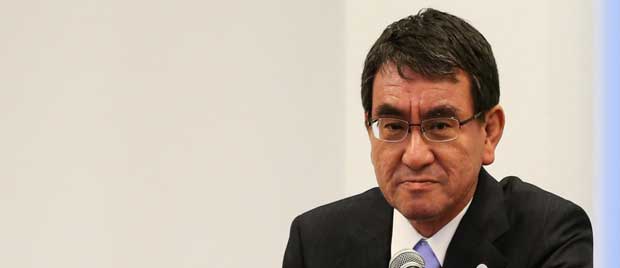Reply To:
Name - Reply Comment
Last Updated : 2024-04-16 21:36:00

The visit to Sri Lanka by Japan’s Foreign Minister Taro Kono (Jan 4 – 6) saw governmental confirmation of Sri Lanka’s first Liquefied Natural Gas (LNG) project. A statement from Prime Minister Ranil Wickremesinghe’s office revealed that an MoU with Japan to build a Floating Storage Re-gasification Unit (FSRU) will be signed this week. The project to build the FSRU and LNG terminal will be a joint venture by Sri Lanka Ports Authority with both Japan and India, it is learnt. The Japanese partner will be a consortium comprising Mitsubishi and Fujitsu, while Petronet will be the Indian partner, according to sources at the Ministry of Development Strategies and Investment Promotion, which will sign the MoU on behalf of Sri Lanka. A new company will be formed with representation from SLPA and the Treasury to be the Sri Lankan partner in this venture the sources said. 
LNG is very new to Sri Lanka as an energy source. What makes LNG different from any other type of power project is that an LNG terminal would include docking facilities within a port, for the special tankers carrying liquefied gas. As a result, the strategic dimension of investment in a LNG terminal or FSRU by any foreign partner cannot be ignored. It is in effect an investment in port development. Sri Lanka’s LNG terminal is to be located within the Colombo port.
The FSRU is actually a special type of ship. LNG is natural gas that has been converted into liquid form for ease of transportation and storage, which is converted back into its gaseous state after it reaches its market destination, and thereafter distributed through pipelines.
Once Sri Lanka’s LNG terminal/ FSRU infrastructure is in place and becomes operational, pipelines from Colombo port will transport the gas to two dual-fuel power plants in Kerawalapitiya expected to be completed around 2021, according to Dr. Suren Batagoda, Secretary Ministry of Power and Energy.
"Japanese envoys never fail to recall the speech made by JR Jayewardena at the San Francisco Peace Conference in 1951,where Sri Lanka came to Japan’s defence and rescue"
One will be built in partnership with the Japanese government and the other in partnership with government of India he said.
Japan’s public broadcaster ‘NHK World’ described Kono’s visit as being “part of Japanese government’s plan to promote cooperation for port expansion projects.” Japan has contributed to the development of navigation facilities in Trincomalee port and has expressed interest in its further development, at various times. Kono’s low profile visit concluded with a tour of Colombo port, including the site for the East Terminal which is yet to be completed under the Colombo Port Expansion Project.Japanese media did not hesitate to report the port visit in the context of Japan’s concerns over China’s growing maritime footprint in the region. “China is increasing involvement in port development in Sri Lanka” reported NHKWorld, adding that “Before the port visit, Kono told reporters that projects to build ports and other infrastructure should be open to any country.”This was not reported locally because the port visit apparently was not open local journalists, with only Japanese media being present. Kono’s remark flagged Japan’s concerns over China’s major role in Sri Lanka’s infrastructure development. His Sri Lanka visit was part of a tour that included Pakistan and the Maldives –also states in which China has significant infrastructure investments under its‘Belt and Road’ initiative.
At a media briefing with a selected group of local journalists in Colombo Japanese Foreign Ministry’s Deputy Press Secretary Toshihide Ando said Japan’s concept is “to develop free and open maritime order in the Indo Pacific region as an international public good,” and that “it is important that we have maritime cooperation in this region.” Asked about the status of talks regarding the development of Trincomalee port, he declined to comment.
MoU with Japan to build a Floating Storage Re-gasification Unit to be signed this week
With Mitsubishi, Fujitsu Petronet will be the Indian partner
Sri Lanka’s LNG terminal is to be located within the Colombo port
The increasingly anxious interest shown by Japan and India in investing in the development of Colombo and Trincomalee ports, is clearly related to concerns arising from Sri Lanka’s lease of Hambantota port to a Chinese company that holds a majority stake. The apparent loss of sovereign control over the port, strategically located near major East-West sea lanes,has led to fears that it may become a Chinese military base, in spite of Sri Lanka’s assurances to the contrary. “We want to ensure that we develop all our ports, and all these ports are used for commercial activity, transparent activity, and will not be available to anyone for any military activity,”PM Wickremesinghe stated in Tokyo last April.
There has been in a shift in the orientation of Japan’s military, or ‘Self-Defence Forces’ as they are called, following the Abe administration’s amendment to the constitution in 2015 allowing them to be deployed in offensive operations that had been prohibited by Article 9 since the end of World War II. This has no doubt created the space for a more assertive Japanese foreign policy.
"Japanese Foreign Ministry’s Deputy Press Secretary Toshihide Ando said Japan’s concept is to develop free and open maritime order in the Indo-Pacific region as an international public good"
As an island nation with scarce natural resources, Japan depends on maritime transport to obtain most of its requirements including energy, hence its concerns over access to sea lanes. Japan’s interests now converge with those of the US and India, and with China being seen as a common adversary, a closer strategic partnership has evolved among the three. Japan now participates in the Malabar naval drills with US and India, and uses US-type rhetoric with terminology like ‘Indo-Pacific’to refer to the Indian Ocean and the Pacific Ocean, blurring the boundaries.
Historically, Japan’s relations with Sri Lanka have been cordial. Japan has been generous with aid and is also a major development partner. During Sri Lanka’s war years Japan was one of the four co-chairs of the peace process, and when the Western co-chairs threatened to cut off aid Japan reassured Sri Lanka that it would not follow suit. Japanese envoys never fail to recall the speech made by JR Jayewardena at the San Francisco Peace Conference in 1951,where Sri Lanka came to Japan’s defence and rescue. “The Japanese still remember that this speech supported Japan’s return to the international society after the WWII,” the visiting foreign minister said in a written interview with an English daily ahead of his visit. One might say Sri Lanka’s relationship with Japan has been somewhat special.
"The increasingly anxious interest shown by Japan and India in investing in the development of Colombo and Trincomalee ports, is clearly related to concerns arising from Sri Lanka’s lease of Hambantota port to a Chinese company that holds a majority stake."
Against this backdrop Japan’s interest in investing in Sri Lankan ports would normally be seen as a welcome development. But with India a partner in the proposed joint venture, and given the evolving strategic landscape, it would now appear to be embedded in a larger trilateral project of countering Chinese influence. This could mean there is a hidden cost, in that Sri Lanka risks being drawn into the eye of the storm in the event of an escalation in tensions between China and the US and/or India.
Analysts tracking Japan’s role in shaping the regional security architecture acknowledge its more robust and independent policies, but also express misgivings.“The only question is how Japan will decide to utilize their naval power in the coming decades” writes Brian Kalan in a military analysis for ‘Southfront.’ “Will it be used in the pursuit of ensuring their independence and peaceful relations with their regional partners, or in the self-destructive pursuit of U.S. hegemony in the region?”
Gamaya Monday, 15 January 2018 06:29 AM
This government will give all ports to foreign countries!! Why Patali and Rathna Thero are silent? What has happened to JVP and Joined Opposition?

Add comment
Comments will be edited (grammar, spelling and slang) and authorized at the discretion of Daily Mirror online. The website also has the right not to publish selected comments.
Reply To:
Name - Reply Comment
On March 26, a couple arriving from Thailand was arrested with 88 live animal
According to villagers from Naula-Moragolla out of 105 families 80 can afford
Is the situation in Sri Lanka so grim that locals harbour hope that they coul
A recent post on social media revealed that three purple-faced langurs near t